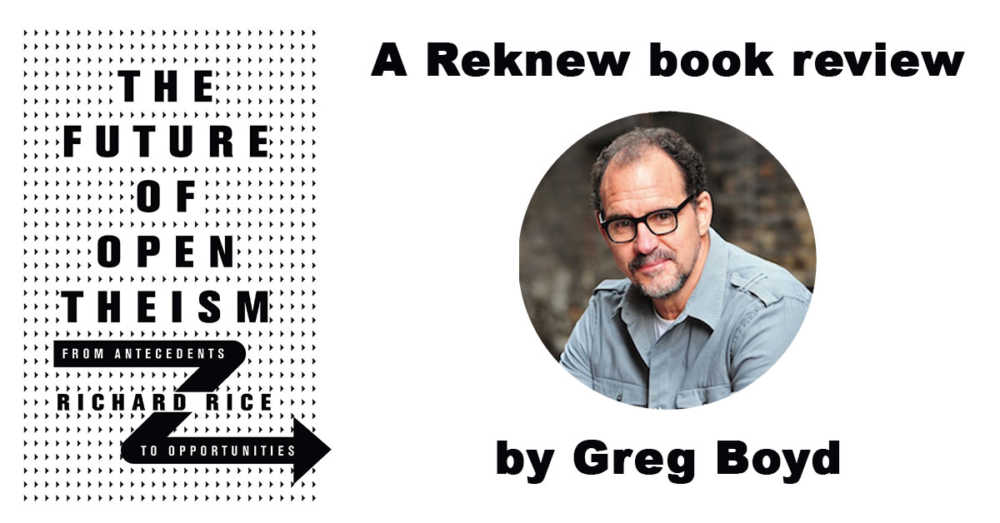We run our website the way we wished the whole internet worked: we provide high quality original content with no ads. We are funded solely by your direct support. Please consider supporting this project.

The Future of Open Theism: From Antecedents to Opportunities (book review)
a book review by Greg Boyd
While there were many precursors to the movement, Open Theism first exploded on the scene as a controversial issue among Evangelicals in the wake of the 1994 publication of The Openness of God (ed. Clark Pinnock). The years immediately following the publication of this landmark book were marked by a torrent of books and articles passionately critiquing and defending the Open View as well as by a flurry of politically motivated activity to have certain Open Theists barred from the Evangelical Theological Society and/or from teaching in certain Evangelical institutions. The debate certainly continues, and some critics of the Open View continue to try to ban Open Theists from certain teaching institutions.[1] Yet, the controversy over Open Theism has on the whole simmered down, at least in terms of publications. And this has left many wondering, “Where does Open Theism go from here?”
This is what makes Richard Rice’s book, The Future of Open Theism, such a timely and helpful book. In this well-written and tightly- argued tome, Rice reviews all the major debates that have surrounded Open Theism up to the present and then maps out a number of theological areas and issues that Open Theists have yet to adequately explore. The comprehensiveness and detail of Rice’s research, combined with the clear, fair and gracious way Rice presents all sides of each issue, make this a truly impressive achievement. I consider myself fairly well read on this particular topic, but I was surprised by the amount that I learned from digesting this work!. Whether you’re venturing into the Open Theism debate for the first time or have been part of this debate from the start, I can almost guarantee you that you will find this very readable 254 page book well worth reading.
In what follows, I will first review five aspects of The Future of Open Theism that I felt were particularly strong, and I’ll follow this with a critique of three areas where I think Rice is either inconsistent or mistaken.
Strengths of The Future of Open Theism
First, most Christians who hold to the traditional understanding of God assume that “Open Theism” represents a single theological perspective. It’s true that all openness theologians affirm that God created free agents whose choices impact him, positively or negatively. And it’s true that all Open Theists affirm that, because agents are free, the future must be conceived of as including unsettled possibilities of what may or may not happen rather than as a domain exclusively comprised of settled eternally facts of all that will or will not happen. Outside of this basic agreement, however, there are a number of fundamental differences among Open Theists, and Rice does an excellent job flushing out what these differences are.
For example, I am persuaded that the problem of “natural” evil cannot be adequately solved unless we accept the perspective of the New Testament and early post-apostolic church that malevolent cosmic agents (Satan, the Principalities and Powers) have corrupted nature as we now find it. By contrast, my openness colleague William Hasker (who, by the way, I have the utmost respect for) has no patience for such considerations. He rather holds that all the violence and suffering that permeates nature is simply a buy-product of the kind of world God had to create if he hoped to arrive a morally responsible free agents.
Similarly, Hasker as well as some other openness thinkers have argued that the truth of what free agents will and will not freely chose to do in the future exists, but they hold that the future is nevertheless open inasmuch as that the truth of what free agents will do is unknowable, even to God. By contrast, I and some other openness thinkers hold that, if the fact of what a free agent will chose in the future exists an eternity before this agent choses it, then the agent isn’t genuinely free to choose otherwise, regardless of whether God knows this fact or not. Not only this, but many Open Theists, myself included, accept that “omniscience” means “God knows all truth,” which entails that all truth is, by definition, knowable by God. In our view, therefore, Hasker’s view is tantamount to denying God is omniscient.
There are a number of differences like this that distinguish Openness advocates from one another, and Rice presents the best single overview of these differences to date.
Second, throughout The Future of Open Theism Rice places the Open View in dialogue with a wide range of theological perspectives, demonstrating how the Open View compliments, conflicts with, and/or otherwise distinguishes itself from these other perspective. For example, Rice places the Open View in dialogue with representatives of Process Theology, Liberation Theology, Feminist Theology, Calvinism, Arminianism, and Thomism, to name just a few. He also has an insightful chapter on the manner in which contemporary neuroscience may not conflict with, and might possibly even support, the Open Views conception of libertarian freedom. The shear breath of the dialogue is admirable and interesting.
I’ll begin my third point by noting that the amount of polemical literature that erupted following the publication of The Openness of God was remarkable. I’m sure I speak for many other Open Theist sympathizers when I say that I also often found this flurry of publications to be a bit infuriating. I quickly found that most critiques dismantled the same old caricature of the Open View with the same old arguments. I confess that, after several years, I pretty much tuned out this constant chorus of critics and chose instead to focus my attention on philosophical discussions, which tended to be more civilized, fair and productive.
Richard Rice does a great job overviewing the most fundamental philosophical issues surrounding Open Theism, but he also apparently kept reading the popular critiques as well, for so far as I can discern, he responds to virtually all of them! (He, clearly, is a more patient man than me). Grant it, this thoroughness makes some sections (especially early on) a bit repetitious, but it indicates the lengths to which Rice was willing to go to “leave no stone unturned.” I would also like to again commend Richard Rice for the fair, respectful and gracious way he consistently interacted with opponents, especially to those who were sometimes not as fair, respectful and gracious toward Open Theists like Rice. I would wish that Open Theism would become as well as known for the gracious way its defenders defend this position, with Rice being our exemplar, as it is for its particular view of God and the future that it defends.
Fourth, one of the most prevalent critiques of Open Theism from conservative evangelicals has been that it amounts to little more than a dumbed down version of Process Theism. The truth is, Open Theism and Process Theism have nothing essential in common except that they both end up espousing an open view of the future. To call Open Theism a version of Process Thought on this basis is like calling Calvinism a version of Islam because it shares the Koran’s determinism. Adding to the concern of some of us, the lines between Open Theism and Process Thought have in recent years been getting blurred by some Open (or Relational) Theists. I therefore greatly appreciate the manner in which Rice carefully distinguished these two movements, demonstrating the importance of the belief in creation ex nihilo and in the possibility of unilateral divine intervention (e.g. miracles) in the process.
Finally, I think The Future of Open Theism would be worth its price had it ended in Part I, but Rice goes on in Part II to map out ways in which Open Theism might intersect with other Christian doctrines; namely, the Trinity, the doctrine of Humanity, Christology, the Church and Eschatology. Rice has many insightful things to share in this material. I found his discussion of the Trinity especially helpful. At the same time, I have to say that it wasn’t always clear to me how his treatment of these topics represented a distinctly Open View. As insightful as this material often was, and as much as I agreed with it, I found little in this material that an Arminian couldn’t fully agree to.
Still, I consider Rice’s brief forays into these doctrines to be a praiseworthy example, and possibly an inspiration, for Open Theists to finally shed our overly-defensive posture and to start working out the implications of an open future in other areas of thought.
Shortcomings of The Future of Open Theism
Compared to the strengths of Rice’s work, the shortcomings I find are relatively minor. Still, this book review wouldn’t be complete if I didn’t offer a few (hopefully) constructive criticisms.
I’ll begin with yet another compliment: Rice has an excellent chapter on why Open Theists should not agree to the use of “Limit Language” to describe their position (121-136). For example, Rice argues that Open Theists shouldn’t describe their view by saying “God has limited foreknowledge,” for this statement presupposes the very settled view of the future that Open Theists deny. That is, God can only be said to have “limited foreknowledge” if there is more about the future for God to know than God in fact knows. But this is precisely what the Open View denies.
Our disagreement with the classical conception of God is not over the scope of God’s knowledge, but the content of the reality that (we all agree) God perfectly knows. Open Theists simply insist that the future includes possibilities, and since God perfectly knows the future, God knows the future partly as a domain of possibilities. I deeply appreciate Rice capturing this point, for many Open Theists have used limited to language to describe their position, especially early on in the movement, and this has only served to reinforce the prevalent caricature that Open Theism espouses a limited deity.[2]
But precisely because Rice captured this point so well, I was disappointed to find him referring to the traditional view (in contrast to the open view) as espousing “absolute foreknowledge” throughout his book. What does “absolute foreknowledge” contrast with if not “limited” or “relative foreknowledge”? The trouble is, “absolute foreknowledge” still presupposes the tradition view of the future as a domain of exhaustively settled facts.” If we rather assume the future includes possibilities, then God’s “absolutely foreknowledge” would include possibilities. If God did not know the future partly as a domain of possibilities, then God’s foreknowledge would not be “absolute.”
I contend that Open Theists ought to stick to talking about the contents of the future that God perfectly knows, for this is where our disagreement with the tradition lies. While the traditional view assumes the future is exhaustively settled and thus ascribes exhaustively definitive foreknowledge (EDF) to God, the open view assumes the future is partly open and thus ascribes to God a partly open and partly settled foreknowledge, conforming perfectly to the partly settled and partly open future that God knows.
Second, I’m afraid Rice was slightly mistaken about several matters pertaining to me. For starters, and simply as a historical note, Rice somehow got the impression that my departure from Bethel University in 2003 had something to do with the attempts of some pastors to get me removed from my teaching position (72). The truth is that my departure happened six years after the debates surrounding my tenure had subsided and had nothing whatsoever to do with this debate.
More importantly, Rice critiques my conception of God’s infinite intelligence, which holds that God can anticipate each and every future possibility as effectively as God anticipates a future certainty. Hence, when an Open Theists experiences tragedy, she can say, as robustly as any Arminian, that God had been preparing a plan from the foundation of the world to bring good out of the evil of this tragedy, just in case this tragedy came to pass. It’s just that Open Theists are convinced that God is so smart, any number of other things might have occurred instead of this tragedy, and if they had, we’d be saying the exact same thing about them.
Rice describes my position by saying: “God sees possibilities with the same degree of definiteness as he sees actualities.” He then critiques this position by claiming that this view “seems to eliminate any difference between God’s experience of an actual event and God’s knowledge of a possible event” (99).
Now, if I held that God “sees” future possibilities “with the same degree of definiteness as God sees actualities,” then Rice would be absolutely correct! In this case, there would be absolutely no difference between God’s experience and God’s (fore)knowledge of an event. Indeed, I hold that degree of definiteness is precisely what distinguishes an actuality from a possibility. But Rice has misunderstood my position. What I have claimed is that God anticipates future possibilities as effectively as he would a future certainty. That is, since a God of infinite intelligence doesn’t need to “spread his intelligence thin” to cover any number of possibilities, God doesn’t lose any providential advantage by virtue of anticipating possibilities rather than settled facts. None of this involves any suggestion that God “sees” or “experiences” possibilities as actualities.
My final critique isn’t really a critique as much as it is a call to notice something. All advocates of Open Theism (at least that I know of) believe that the classical view of God (as actus purus, immutable, impassible, timeless) is the result of Hellenistic philosophical assumptions creeping in on the theologizing of early church fathers. This is sometimes referred to as “The Fall into Hellenization” thesis. Though Rice never mentions this thesis by name or weighs in on any of the voluminous issues surrounding it, he notes at a number of points how certain Openness thinkers espouse this view.
I accept the “Falling to Hellenization” thesis, yet, the goal posts surrounding this debate have recently moved, or perhaps are still in the process of being moved. Over the last twenty years or so, some formidable scholars have offered trenchant critiques of “The Fall into Hellenization” Thesis. Scholars such as Paul Gavrilyuk, Thomas G. Weinandy and Mark Edwards have effectively argued that, when most early fathers spoke of God as “impassible” or “immutable,” for example, they did not at all intend to endorse a distant and unaffected conception of God, as the advocates of the “Fall into Hellenization” thesis contend.[3] The critique that these fathers imported a distant and unaffected deity into Christian theology has thus been shown to be simplistic and misguided. In this light, the case for demonstrating that the early Christian conception of God was corrupted by Hellenistic philosophy is going to have to respond to the new defenders of the classical view and will need to be much more complicated and nuanced than cases for this perspective have up to this point been.[4]
This, in fact, is precisely the project I am currently engaged in.
There are a few other points I could squabble with Rice over, but I’ve said enough for now, and besides, compared to the formidable strengths of this book, these squabbles are not worth mentioning. Bottom line, if you’re looking for a well-written, fair, comprehensive, and insightful summing up of where Open Theism has been and where we might be heading, The Future of Open Theism is the book you’re looking for.
___ ___ ___
1 — As happened for example, in the fall of 2018 with Bruxy Cavey, Brian Zahnd and myself at Fresno Mennonite Seminary. https://www.christianpost.com/news/mennonite-seminary-demotes-president-ousts-3-megachurch-pastors-serving-as-lecturers.html
2 — I wrote an essay entitled “God Limits His Control” in Four Views of Divine Providence (Grand Rapids: Zondervan, 2011), 176-208. Suffice it to say that the editor of this work chose this title and I did not object to it as strongly as I would today.
3 — Paul L. Gavrilyuk, The Suffering of the Impassible God: The DFialectics of Patristic Thought (New York: Oxford University Press, 2004); Thomas G. Weinandy, Does God Suffer? Notre Dame, IN: University of Notre Dame Press:2000;Mark J. Edwards, Origen Against Plato (Burlington VT: Ashgate, 2002).
4 — This is precisely the project I am currently working on. The work is tentative titled Alien Perfection (previously advertised as The Myth of the Blueprint).
Category: Essays, General
Tags: Book Reviews, Books
Topics: Open Theism
Related Reading

God at War Endorsements and Reviews
Endorsements: “God at War raises the current discussion of spiritual warfare to a new and unanticipated level of scholarly investigation. I am ecstatic with the integrity with which Gregory Boyd develops his convincing argument for a biblical warfare worldview. This is an extremely important work for all who wish to advance God’s Kingdom today.” –C.…

Podcast: A Flexible Faith: The Bonnie Kristian Interview
Dan interviews Bonnie Kristian on her new book: A Flexible Faith: Rethinking What It Means to Follow Jesus Today http://traffic.libsyn.com/askgregboyd/Episode_0344.mp3

Part 11 (of 15): The Corruption of Creation
Assessing Jordan Peterson’s 12 Rules for Life by Greg Boyd “With their capacity for aggression strait-jacketed within a too-narrow morality, those who are only or merely compassionate and self-sacrificing…cannot call forth the genuinely righteous and appropriately self-protective anger necessary to defend themselves.” Jordan Peterson In the previous three posts (post 8, post 9, post 10)…

Podcast: Greg Offers Some Book Recommendations
With consternation and gnashing of teeth, Greg shares some of his favorite books. http://traffic.libsyn.com/askgregboyd/Episode_0304.mp3

A Review of Colson’s God & Government
Chuck Colson is one of the most respected, influential voices in the modern Evangelical movement. His book God & Government is an important one, for in this work we find Colson’s seasoned reflections on the relationship between Church and State. Having heard Colson speak on many political matters on his daily radio broadcast (“Breakpoint”), I…

Part 2 (of 15): Can ‘Being’ Be Justified?
Assessing Jordan Peterson’s “12 Rules for Life” by Greg Boyd ~“Pain and suffering define the world. Of that, there can be no doubt.” ~ Jordan Peterson One of the things that makes Peterson’s approach to understanding life so intriguing and appealing to so many people is that it is remarkably multifaceted. 12 Rules of Life…
